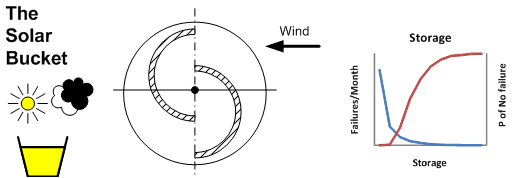Don't talk about.........
I do not know how accurate this graph is, it was literally done on the back of an envelope with a few photocopies of some government statistics around 2007 when I had a period of enforced idleness. For all practical purposes, it is a statement of the obvious i.e. the higher your level of income, the greater your level of CO2 emissions.
The graph leads to two observations, the first is that the lower the household income, the greater the proportion spent on energy, which has resulted in policies such as the pensioner's winter fuel supplement. The second is a little more subtle, that as household income increases, the weaker the link between energy consumption and energy price.
Energy sustainability is based on three elements, emission free generation and energy management, sometimes called conservation. Despite strong opinions for and against, wind farms, rooftop PV and similar concepts are openly discussed in both the media and pubs. However, conservation is a difficult subject.
A few years back, legislation was introduced restricting the sale and use of incandescent light bulbs. Back in 2005, most houses were lit with a mix of 60 and 100 watt incandescent light bulbs, Today, most homes that let me through the front door appear to have adopted 10 - 20 watt CFLs. When the legislation was introduced, I remember some shops selling incandescent light bulbs presenting themselves as champions of civil liberty. In our case, had we not made the switch from incandescent to CFL, our electricity bill would be more than £100/month. The bottom line of this paragraph is that if an energy management technology makes some economic sense, it will be adopted.
It is when the discussion moves to cars, that passions are really aroused. This is illustrated by a couple of song titles "Little Red Corvette" by Prince and the Beach Boys "Fun, fun, fun" which has the line "Til her daddy takes the t-bird away", don't we all want to be part of the story. There may be a generational difference, mine tended to lust after things like Frog-eyed Sprites whilst the current one favours large SUVs and Pick-up trucks, I appreciate that this observation may not stand up to scrutiny. Due to dodgy eyesight, I rarely drive and use a bicycle for short trips and public transport for longer ones, prior to making this move, I was as attached to my car as the next guy, but it has been a liberating experience, around town the bike is quicker and cheaper and I can read the news on my smartphone when travelling on buses and trains. It is clear that cycling is increasing in popularity, but the perceived independence, status and level of control bestowed by being behind the wheel of a car maintain a strong grip on society as a whole. Making the case that the car brings mixed blessings, except to fellow cyclists, is not a good opening line at parties.
It is hard to make conservation attractive and even harder for high income groups, the link economics (e.g. CFL's versus incandescent light bulbs) and greater functionality (e.g. bike versus car in urban environments) is often perceived as a reduction in status and self-denial neither of which are much fun.
Friday, 21 June 2013
Subscribe to:
Post Comments (Atom)



No comments:
Post a Comment